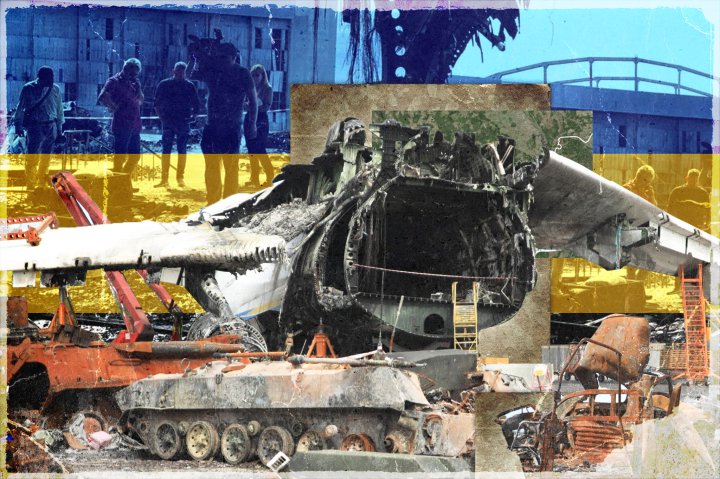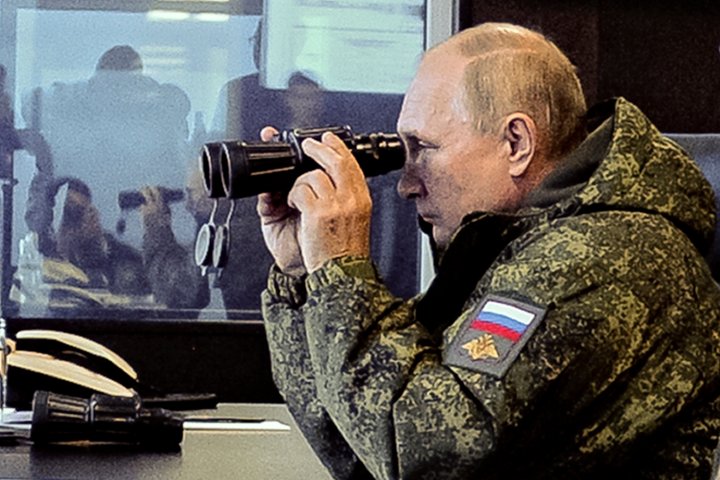
By
Sean Boynton
Global News
Published August 28, 2022
6 min read

Before Russia began its invasion of Ukraine just over six months ago, Artur Chenakal was living a peaceful life in Kyiv with two cats while working as a cook.
Now, he’s fighting on the front lines in the eastern Donetsk province, which has been bombarded daily by Russian attacks. He and his fellow volunteer fighters and soldiers are sleeping in tents and destroyed homes as explosions are heard nearby.
Despite the living conditions, “the morale and physical condition (among the Ukrainian troops) is high,” he told Global News in audio messages recorded from his position near the city of Bakhmut — a key Russian target where destroyed infrastructure has made communication difficult.
With no end in sight, Ukrainian President Volodymyr Zelenskyy has warned that the war will determine “the world’s future” and whether Russia will be deterred from its campaign of “insane aggression.”
In conversations with Global News, fighters and paramedics who have spent the past six months witnessing the horrors of war first-hand expressed the same urgency, along with a resolve to not give up.
“We will fight, we will finish this war and we will kick out the invaders,” Chenakal said.
Chenakal knew right away that the war would last a long time, but says he never thought twice about joining the fight or staying there until the end.
“There was no choice,” he said. “We couldn’t return to our regular lives (after a couple of months).”
In the early weeks of the invasion, Chenakal served as a grenade launcher and was among the Ukrainian forces that held Russia back from the capital, ultimately forcing them to retreat.
Once Moscow refocused its efforts on the separatist Donbass region, in eastern Ukraine, he followed the defence forces there and trained as a combat medic.
Chenakal first arrived in the Luhansk province with a friend he had been fighting alongside since the war began, only to be separated into different units.
“We were always next to each other, but for the last two months we were about a kilometre from each other,” he said.
Last month, he says his friend’s unit came under mortar fire.
“He died and I could not say goodbye to him,” he said.
Gen. Valeriy Zaluzhnyi, the top commander of the Ukrainian Armed Forces, said Monday that about 9,000 fighters have been killed on the front lines. He did not say if that number, which has not been independently verified, includes all branches of the military or whether the number encompassed the entire six months of the war.
He added in a speech to veterans that those on the front lines are living a “constant hell.”
Russia has not shared an update on its military casualties since March, but Western intelligence has put the number around 20,000 troops. Ukraine’s military claimed on Thursday nearly 46,000 Russian soldiers have been killed.
The United Nations, meanwhile, has confirmed 5,587 civilians killed and another 7,890 wounded since the war began, though the Office of the High Commissioner for Human Rights believes the numbers are far higher.
Paramedics like Yuliia Sidorova and Volodymyr Ventsel have tended to many of those civilians, all while watching their home city of Kharkiv turn into ruins.
Ukraine’s second-largest city was, along with Kyiv, an early target of Russian attacks and continues to suffer missile attacks that have destroyed civilian infrastructure, including several universities and research facilities.
“It’s very difficult to explain the feeling of seeing the ruins of your city,” Ventsel said in a phone interview.
“There used to be children playing in the streets, students walking around. Right now it’s not like that. There’s not so many people like there was before.”
Russian troops have also continued ground offences on nearby villages in an attempt to close in on the city, forcing Ukrainian fighters to push them back.
Amidst the constant barrage, paramedics have had to risk their own lives getting victims out of harm’s way while tending to their injuries.
“Every time there’s a military operation or attack, we thank God that we’re able to return to base or go back home alive this time,” Sidorova said through Zoom, with the help of an interpreter.
“It’s a miracle every time.”
The invasion marks the second time Sidorova has joined a conflict as a paramedic, having received her medical training when the Ukrainian revolution broke out in 2014.
After leaving medicine in 2019 to pursue a fashion career, she was called back to service when the first Russian missiles began striking Ukraine on Feb. 24.
“This was not my decision, it was my duty,” she said.
The missile attacks are less frequent than they were in the early weeks of the war, yet first responders are still on edge.
In the lead-up to Ukrainian Independence Day on Wednesday, Ventsel said he and his fellow paramedics were working 24-hour shifts to prepare for the possibility of a major strike.
“We are all exhausted and tired, but I try not to think about it,” he said. “If I do, then I start to worry and it becomes much more terrible, more exhausting … and I still have a job to do.”
Sidorova says she learned coping mechanisms during the revolution, but also says she can’t afford to fall back into the depression she suffered back then.
“This is not a regular war, it is a war about good and evil,” she said. “We can be depressed or tired or whatever, but we have to keep fighting for the good.”
What fighters and first responders do need, however, is equipment and training, which Western countries have continued to provide throughout the war.
To date, Canada has delivered and otherwise committed $626 million in military aid to Ukraine, including armoured vehicles, artillery, ammunition and other equipment. Canada has also deployed troops to Europe to train Ukrainian fighters.
The United States has provided about US$10.6 billion in military support since the beginning of the Biden administration and has also pledged to train troops. President Joe Biden announced a new aid package worth roughly US$3 billion on Wednesday.
Sidorova says her team is in need of tactical evacuation vehicles, oxygen masks and medical kits for the field.
Chenakal, now providing medical aid while fighting on the front lines in the Donbass, says his battalion is still suffering losses “but thanks to God not so many.” Injuries have also been relatively minor, he adds.
He says the aid that does come from other countries arrives slowly, which needs to be addressed. But he adds Ukrainians have also stepped up to help each other, with volunteer organizations supplying many of the fighters’ day-to-day needs.
As the war enters its seventh month, many other challenges remain. Attacks on a nuclear power plant in the Zaporizhzhia province has heightened fears of a catastrophe. Russian President Vladimir Putin is looking to grow his beleaguered army. And about 13 million Ukrainians are estimated to be stranded in affected conflict zones with no way to escape.
First responders are hoping the rest of the world doesn’t forget the hardships still being faced in their country, nor the ongoing threat to their sovereignty as Russia keeps up its assault.
“We have to protect the world from this aggression,” Sidorova said. “And unfortunately, it’s not over yet.”













Comments